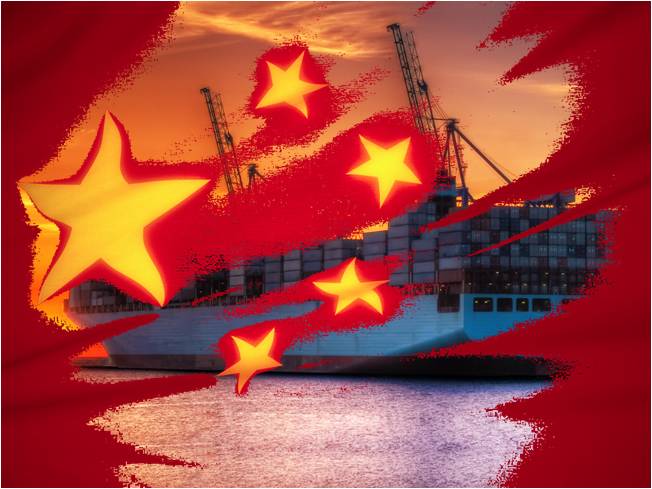China Enforcing China Advance Manifest (CCAM) Similar to US ISF
China Customs is implementing China Advance Manifest (CCAM) for all import shipments to China.
 Could we fit one more “China” into that opening sentence?
Could we fit one more “China” into that opening sentence?
If you export cargo to China, you need to know that China Customs is implementing China Advance Manifest (CCAM) for all import shipments to China. Look at that, we could fit one more “China” in that sentence.
What does this CCAM mean for shippers?
On a basic, pragmatic level, it means you need make sure you get your paperwork in as early as possible.
You can call the CCAM China’s 24 hour Advance Manifest Regulation. What China is doing is requiring CCAM declaration paperwork to be turned in to China Customs at least 24 hours before the cargo vessel departs from its origin port.
This was scheduled to begin June 30th, 2014, but Shanghai Customs advised advance manifest submission is required for all import cargo discharged or transshipped at the Shanghai port effective June 3rd. Do Not Load (DNL) and Do Not Unload (DNU) messages may be issued at China Customs if shippers are not in compliance with their cargo.
All the major carriers that ship your cargo across the ocean have made similar announcements concerning China Customs’ CCAM policy and how it affects the policies of the carriers. Basically, shippers must have their manifest paperwork in to China Customs before it will be loaded onto cargo ships.
For example, here’s an excerpt from Maersk’s announcement on China Customs’ CCAM:
As soon as China Customs decides to enforce the new CCAM regulation, Maersk will strictly follow the “no Doc, no Load” policy immediately, which means only those cargo with complete and accurate customs declaration information and accepted by China Customs would be loaded.
The type of information required of shippers for CCAM is:
- Voyage Number
- Vessel Name
- Bill Of Lading Number
- Measurement Of Cargo
- Port Of Loading
- Payment Method For Ocean Freight (Prepaid or Collect)
- Total Number Of Packages
- Type of Packages
- Total Gross Weight Of Cargo Including Packaging But Excluding Container Tare Weight
- Name of Consignee
- Complete Street Address Or P.O. Box Number Of Consignee
- Name Of Shipper
- Complete Street Address Or P.O. Box Number Of Shipper
- Name of Notify Party (Mandatory if consignee is “To Order”.)
- Complete Street Address Or P.O. Box Number Of Notify Party (Mandatory if consignee is “To Order”.)
- Name Of Contact Person For Dangerous Cargo (Mandatory when such commodity is being shipped.)
- Contact Number Of Contact Person For Dangerous Cargo (Mandatory when such commodity is being shipped.)
- Container Number
- Container Size And Type
- Seal Numbers For All Seals Affixed To Containers
- Type Of Packages Per Commodity Item
- Number Of Packages Per Commodity Item
- Cargo Description
- Gross Weight Per Commodity Item
- UNDG Number for Dangerous Cargo (Mandatory when such commodity is being shipped.)
- Marks And Numbers
Don’t worry. You don’t actually have to submit directly to and deal with China Customs. That’s part of why you hire a freight forwarder like Universal Cargo Management.
The typical chain of paperwork is that you give your paperwork to Universal Cargo Management, we submit it to the carrier, who then turns it in to China Customs. That chain of paperwork can look a bit different, but we handle all of that.
Of course, we’ll make sure you have all the paperwork to make your exports to China run smoothly. Just make sure you fill out your paperwork and turn it in promptly to ensure there are no delays on the shipping schedule of your cargo.
This is not some unprecedented policy from China. It is not even the first time China Customs has issued CCAM. But the easiest way to think about the CCAM is to realize that it is much like the Importer Security Filing (ISF) here in the US.
If you’re unfamiliar, ISF became mandatory in the US back in January of 2010 and is made up of 10 data elements which are required to be sent to US Customs on all ocean freight imports to the United States. It is important to note that ISF paperwork is distinct from the AMS data elements that the carrier lines are required to file with US Customs.
The 10 information points required by ISF are:
- Supplier or Manufacturer
- Seller
- Consolidator/Forwarder
- Container Stuffing Location
- Importer of Record or FTZ Applicant
- Buyer
- Ship to Party/Consignee Number
- AMS Waybill Number
- HTS Number
- Country of Origin
Whether you’re importing or exporting, Universal Cargo Management will make sure all the paperwork for your shipping is properly handled. With UCM having almost 30 years as a trusted freight forwarder, you can be confident your international shipping is in good hands.
![]()
Source: China

